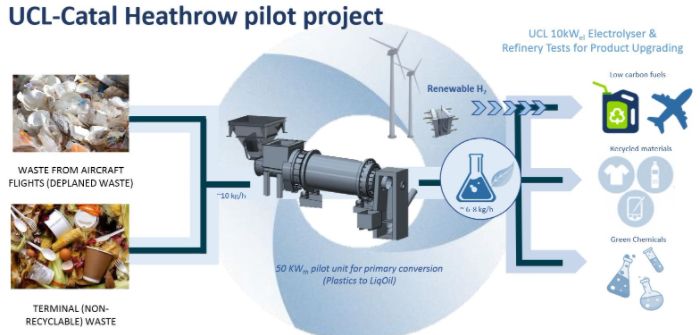London Heathrow Airport is to trial new technology that could turn unrecyclable passenger waste, including food packaging and plastic film, into airport furniture, uniforms and alternative fuels.
The airport is testing a new recycling unit which, once scaled up, has the potential to process up to 5,000 metric tons of non-recyclable plastic, and could allow Heathrow to recycle 100% of its on-airport plastic waste.
The pilot plant, developed by Heathrow’s Innovation Prize winners, Sheffield-based company Catal and University College London’s Massimiliano Materazzi, has the potential to save waste from incineration by turning it into its original oil state for recycling. If successful, the plant will enable Heathrow to recycle all plastic waste from the airport where regulations permit.
Once the waste is refined using this new technology, the resulting oil will be collected and processed in a separate facility that makes use of renewable hydrogen to upgrade the oil into new-generation, low-carbon products such as furniture and uniforms. It is estimated that between 5kg and 8kg (11 lb and 18 lb) of plastics oil will be produced for every 10kg (22 lb) of waste handled each hour. Researchers say it’s also possible that this oil can be transformed into Jet A1-type sustainable fuel – this will be investigated further during the trial.
Heathrow will help to kick-start the trial unit by awarding researchers a cash boost of £30,000 (US$37,625). Catal and UCL plan to roll out commercial units to other airports by 2025.
Heathrow sustainability and environment director, Matt Gorman, said, “People are rightly concerned about plastic waste. Tens of thousands of tons of it are produced by UK air passengers every year, which is something we must tackle. That’s why we’re helping to fund this R&D project, which could make Heathrow the first UK airport to be able to recycle all plastic waste generated at the airport. This could create a step-change in how airports across the UK manage plastic waste – giving passengers the confidence to travel knowing their plastics are sorted.”

